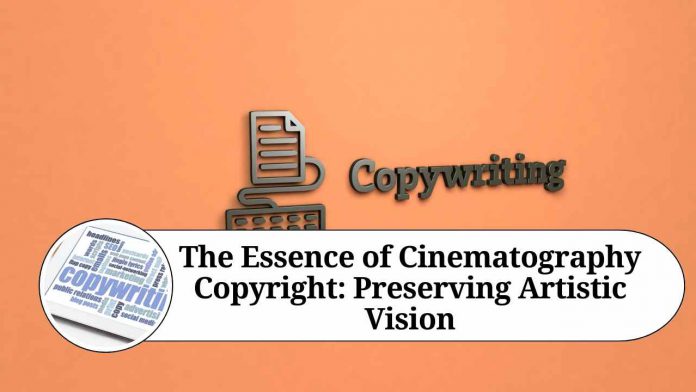Introduction:
Cinematography is an art form that captures the essence of storytelling through visual imagery. The skillful arrangement of camera angles, lighting, composition, and movement can create powerful and evocative scenes that stay with audiences long after the credits roll. However, like any creative endeavor, the works of cinematographers deserve protection through copyright law. In this blog, we will delve into the world of cinematography copyright, exploring its importance, challenges, and implications for both creators and consumers.
The Importance of Cinematography Copyright:
Copyright is a legal mechanism that grants creators exclusive rights over their original works, enabling them to control and monetize their creations. Cinematography copyright plays a vital role in safeguarding the artistic vision of cinematographers, allowing them to maintain ownership and control over their work. It ensures that their efforts are recognized, respected, and properly compensated.
- Preserving artistic integrity: Cinematography copyright safeguards the creative choices made by cinematographers. It ensures that their intended vision remains intact and is not subject to unauthorized modifications or misrepresentation. Copyright protection encourages filmmakers to invest their time, skills, and resources, knowing that their work is safeguarded from exploitation.
- Encouraging innovation and creativity: Copyright protection incentivizes cinematographers to push boundaries, explore new techniques, and develop unique visual styles. By offering legal protection, creators are motivated to invest in their craft, fostering a culture of innovation and artistic growth within the industry.
- Economic sustainability: Copyright protection allows cinematographers to monetize their work through licensing, distribution deals, and royalties. By controlling the use and reproduction of their creations, cinematographers can negotiate fair compensation, ensuring a sustainable livelihood and further investment in future projects.
Challenges and Considerations:
While cinematography copyright is crucial for protecting the rights of creators, it also presents some challenges and considerations:
- Collaboration and joint authorship: Filmmaking involves multiple creative minds working together, such as directors, cinematographers, and editors. Determining copyright ownership and addressing potential conflicts can be complex, particularly when there are different contributions to the final product. Clear agreements and contracts are essential to establish copyright ownership and prevent disputes.
- Fair use and transformative works: Copyright law recognizes fair use, allowing limited use of copyrighted material for purposes such as commentary, criticism, or educational purposes. Determining what constitutes fair use in the context of cinematography can be subjective and often requires legal interpretation. Balancing the rights of creators with the freedom of expression is a delicate task.
- Technological advancements and piracy: Rapid technological advancements have made it easier to copy, distribute, and access copyrighted material. The rise of online piracy poses a significant challenge to cinematography copyright, as unauthorized copies can harm the commercial viability and financial return of a project. It is essential to enforce copyright laws and explore innovative methods to protect intellectual property in the digital age.
The Future of Cinematography Copyright:
As the world of filmmaking evolves, cinematography copyright will continue to play a crucial role in preserving artistic integrity and promoting creativity. However, the landscape is likely to face new challenges and opportunities:
- International collaboration: Filmmaking is a global industry, with collaborations often spanning across countries and continents. Harmonizing copyright laws and addressing cross-border challenges will be essential to protect the rights of cinematographers in an increasingly interconnected world.
- Digital distribution and streaming: With the proliferation of online streaming platforms, the distribution and consumption of cinematographic works have undergone significant changes. Ensuring that cinematographers receive fair compensation in this evolving landscape will be a key consideration for copyright law and industry agreements.
Frequently Asked Questions (FAQs)
Q.What is cinematography copyright?
Cinematography copyright refers to the legal protection granted to cinematographers for their original visual works. It encompasses the creative elements involved in capturing and crafting visual imagery, such as camera angles, lighting, composition, and camera movements.
Q.What does cinematography copyright protect?
Cinematography copyright protects the expression of ideas and creative choices made by cinematographers. It safeguards their original works from unauthorized copying, distribution, or modification. It grants them exclusive rights to control the use and reproduction of their cinematographic creations.
Q.How do I obtain cinematography copyright?
Cinematography copyright is automatically granted to cinematographers as soon as they create an original work. There is no need to register or apply for copyright protection. However, it is advisable to document your work and retain evidence of your authorship in case of any disputes.
Q.Can I copyright the entire film as a cinematographer?
As a cinematographer, you can only copyright your specific contributions to the film, such as the visual elements you created or captured. Copyright protection does not extend to the entire film itself, as it is a collaborative work involving various creative inputs.
Q.What rights does cinematography copyright grant?
Cinematography copyright grants cinematographers several exclusive rights, including the right to reproduce their work, distribute copies, publicly display the work, and create derivative works based on their original cinematographic creations. These rights allow cinematographers to control and monetize their works.
Q.What is fair use in cinematography copyright?
Fair use is a legal doctrine that allows limited use of copyrighted material without permission from the copyright holder. In the context of cinematography, fair use may apply when using copyrighted material for purposes such as commentary, criticism, education, or parody. Determining fair use requires a case-by-case analysis, considering factors such as the purpose and nature of the use, the amount used, and the effect on the market for the original work.
Q.How long does cinematography copyright last?
In most countries, cinematography copyright lasts for the life of the cinematographer plus an additional period after their death. The duration can vary depending on national copyright laws, but it typically extends for several decades.
Q.Can I use copyrighted cinematographic works for educational purposes?
Using copyrighted cinematographic works for educational purposes may be allowed under certain circumstances, such as in classroom settings or for research purposes. However, the specific limitations and exceptions for educational use can vary by country. It is advisable to familiarize yourself with the copyright laws in your jurisdiction or consult legal professionals for guidance.
Q.What should I do if my cinematographic work is infringed?
If you believe your cinematographic work has been infringed, it is advisable to gather evidence of the infringement and consult with an intellectual property lawyer. They can guide you on the appropriate steps to take, such as sending a cease-and-desist letter, filing a lawsuit, or pursuing alternative dispute resolution methods.
Q.How can cinematographers protect their copyright in the digital age?
In the digital age, protecting cinematography copyright requires a combination of legal measures and technological solutions. These can include watermarking your work, using digital rights management (DRM) tools, monitoring online platforms for unauthorized use, and enforcing copyright through legal action when necessary. Regularly educating yourself about copyright laws and staying updated on industry practices can also help safeguard your rights.




















